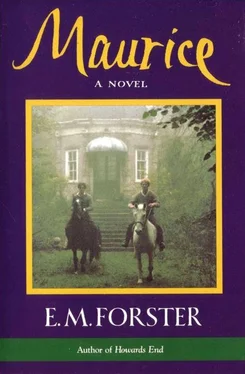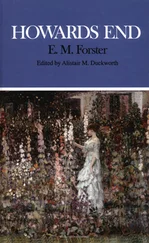Clive was silent so long that Maurice thought him asleep. At last he sighed, "I suppose I'd better have the nurse."
"Right: she will make you more comfortable than I can. Perhaps you're right."
Clive made no reply.
Ada had volunteered to sit up in the room below, and, according to arrangement, Maurice tapped three times, and while waiting for her studied Clive's blurred and sweaty face. It was useless the doctor talking: his friend was in agony. He longed to embrace him, but remembered this had brought on the hysteria, and besides, Clive was restrained, fastidious almost. As Ada did not come he went downstairs, and found that she had fallen asleep. She lay, the picture of health, in a big leather chair, with her hands dropped on either side and her feet stretched out. Her bosom rose and fell, her heavy black hair served as a cushion to her face, and between her lips he saw teeth and a scarlet tongue. "Wake up," he cried irritably.
Ada woke.
"How do you expect to hear the front door when the nurse comes?"
"How is poor Mr Durham?"
"Very ill; dangerously ill."
"Oh Maurice! Maurice!"
"The nurse is to stop. I called you, but you never came. Go off to bed now, as you can't even help that much."
"Mother said I must sit up, because the nurse mustn't be let in by a man — it wouldn't look well."
"I can't think how you have time to think of such rubbish," said Maurice.
"We must keep the house a good name."
He was silent, then laughed in the way the girls disliked. At the bottom of their hearts they disliked him entirely, but were too confused mentally to know this. His laugh was the only grievance they avowed.
"Nurses are not nice. No nice girl would be a nurse. If they are you may be sure they do not come from nice homes, or they would stop at home."
"Ada, how long were you at school?" asked her brother, as he helped himself to a drink.
"I call going to school stopping at home."
He set down his glass with a clank, and left her. Clive's eyes were open, but he did not speak or seem to know that Maurice had returned, nor did the coming of the nurse arouse him.
21
It was plain in a few days that nothing serious was amiss with the visitor. The attack, despite its dramatic start, was less serious than its predecessor, and soon allowed his removal to Penge. His appearance and spirits remained poor, but that must be expected after influenza, and no one except Maurice felt the least uneasiness.
Maurice thought seldom about disease and death, but when he did it was with strong disapproval. They could not be allowed to spoil his life or his friend's, and he brought all his youth and health to bear on Clive. He was with him constantly, going down uninvited to Penge for weekends or for a few days' holiday, and trying by example rather than precept to cheer him up. Clive did not respond. He could rouse himself in company, and even affect interest in a right of way question that had arisen between the Durhams and the British Public, but when they were alone he relapsed into gloom, would not speak, or spoke in a half serious, half joking way that tells of mental exhaustion. He determined to go to Greece. That was the only point on which he held firm. He would go, though the month would be September, and he alone. "It must be done," he said. "It is a vow. Every barbarian must give the Acropolis its chance once."
Maurice had no use for Greece. His interest in the classics had been slight and obscene, and had vanished when he loved
Clive. The stories of Harmodius and Aristogeiton, of Phaedrus. of the Theban Band were well enough for those whose hearts were empty, but no substitute for life. That Clive should occasionally prefer them puzzled him. In Italy, which he liked well enough in spite of the food and the frescoes, he had refused to cross to the yet holier land beyond the Adriatic. "It sounds out of repair" was his argument. "A heap of old stones without any paint on. At all events this"1 — he indicated the library of Siena Cathedral — "you may say what you like, but it is in working order." Clive, in his amusement, jumped up and down upon the Piccolomini tiles, and the custodian laughed too instead of scolding them. Italy had been very jolly — as much as one wants in the way of sight-seeing surely — but in these latter days Greece had cropped up again. Maurice hated the very word, and by a curious inversion connected it with morbidity and death. Whenever he wanted to plan, to play tennis, to talk nonsense, Greece intervened. Clive saw his antipathy, and took to teasing him about it, not very kindly.
For Clive wasn't kind: it was to Maurice the most serious of all the symptoms. He would make slightly malicious remarks, and use his intimate knowledge to wound. He failed: i.e., his knowledge was incomplete, or he would have known the impossibility of vexing athletic love. If Maurice sometimes parried outwardly it was because he felt it human to respond: he always had been put off Christ turning the other cheek. Inwardly nothing vexed him. The desire for union was too strong to admit resentment. And sometimes, quite cheerfully, he would conduct a parallel conversation, hitting out at Clive at times in acknowledgement of his presence, but going his own way towards light, in hope that the beloved would follow.
Their last conversation took place on these lines. It was the evening before Clive's departure, and he had the whole of the
Hall family to dine with him at the Savoy, as a return for their kindness to him, and had sandwiched them out between some other friends. "We shall know what it is if you fall this time," cried Ada, nodding at the champagne. "Your health!" he replied. "And the health of all ladies. Come, Maurice!" It pleased him to be slightly old-fashioned. Healths were drunk, and only Maurice detected the underlying bitterness.
After the banquet he said to Maurice, "Are you sleeping at home?"
"No."
"I thought you might want to see your people home."
"Not he, Mr Durham," said his mother. "Nothing I can do or say can make him miss a Wednesday. Maurice is a regular old bachelor."
"My flat's upside down with packing," remarked Clive. "I leave by the morning train, and go straight through to Marseilles."
Maurice took no notice, and came. They stood yawning at each other, while the lift descended for them, then sped upwards, climbed another stage on their feet, and went down a passage that recalled the approach to Risley's rooms at Trinity. The flat, small, dark, and silent, lay at the end. It was, as Clive said, littered with rubbish, but his housekeeper, who slept out, had made up Maurice's bed as usual, and had arranged drinks.
"Yet again," remarked Clive.
Maurice liked alcohol, and had a good head.
"I'm going to bed. I see you've found what you wanted."
"Take care of yourself. Don't overdo the ruins. By the way — " He took a phial out of his pocket. "I knew you'd forget this. Chlorodyne."
"Chlorodyne! Your contribution!"
He nodded, "Chlorodyne for Greece… Ada has been telling me that you thought I was going to die. Why on earth do you worry about my health? There's no fear. I shan't ever have so clean and clear an experience as death."
"I know I shall die some time and I don't want to, nor you to. If either of us goes, nothing's left for both. I don't know if you call that clean and clear?"
"Yes, I do."
"Then I'd rather be dirty," said Maurice, after a pause. Clive shivered.
"Don't you agree?"
"Oh, you're getting like everyone else. You will have a theory. We can't go quietly ahead, we must always be formulating, though every formula breaks down. 'Dirt at all costs' is to be yours. I say there are cases when one gets too dirty. Then Lethe, if there is such a river, will wash it away. But there may not be such a river. The Greeks assumed little enough, yet too much perhaps. There may be no forgetfulness beyond the grave. This wretched equipment may continue. In other words, beyond the grave there may be Hell."
Читать дальше












